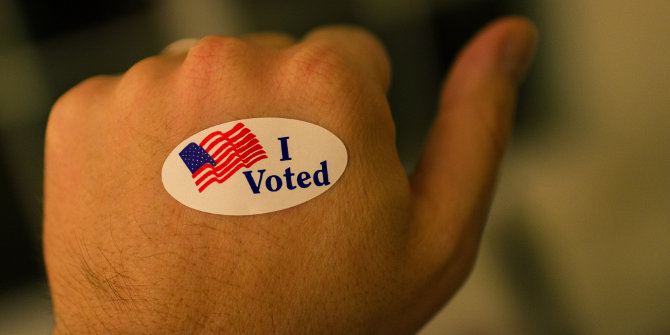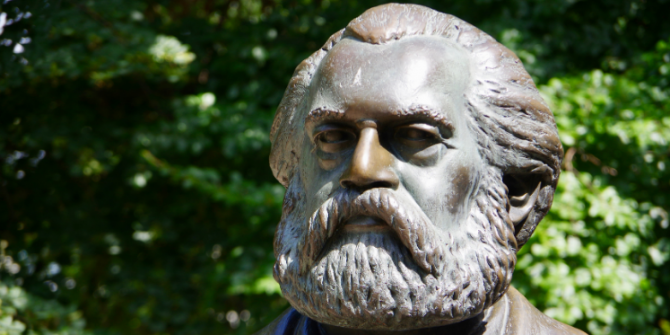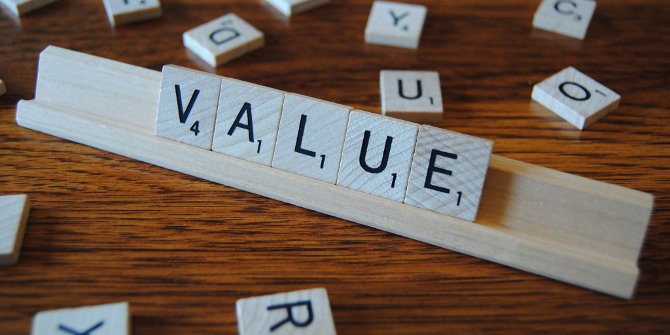


 For many, the benefits of voting are not immediately obvious. So why do people turn out on Election Day? Some have suggested that people vote because they are worried that others will view them less favorably if they do not. Using experimental evidence from a national survey, David Doherty, Gregory Huber, Alan Gerber and Conor Dowling set out to test this theory. Their results suggest that people’s expectations that others will think less of them if they fail to vote are well-founded.
For many, the benefits of voting are not immediately obvious. So why do people turn out on Election Day? Some have suggested that people vote because they are worried that others will view them less favorably if they do not. Using experimental evidence from a national survey, David Doherty, Gregory Huber, Alan Gerber and Conor Dowling set out to test this theory. Their results suggest that people’s expectations that others will think less of them if they fail to vote are well-founded.
This November in the United States over a hundred million people are likely to cast ballots in the presidential election. At the same time, it is also likely that tens of millions of eligible voters will choose not to vote. If history is a guide, pundits, activists, and others will bemoan the fact that turnout rates in the United States tend to fall short of those in other established democracies.
From a strictly instrumental perspective, however, it is a wonder that anyone turns out to vote at all. That is, voting appears to be a rather irrational act. For one thing, from the perspective of an individual, it is often not entirely clear what one stands to gain or lose from one candidate winning over the other. Moreover, whatever the potential policy benefits of deciding an election, the chances that one individual will do so with their vote is vanishingly small. Finally, the act of voting takes time (sometimes stunning amounts of time)—time that could be spent on activities ranging from earning wages to enjoyable leisure. In short, from a strictly instrumental perspective the act of voting looks a lot like paying for a lottery ticket where the odds are extremely long and the payoff is uncertain.
One explanation for the fact that so many people do choose to take the time to vote is that the benefits of voting extend beyond the opportunity to take a chance on the possibility that one’s vote will tip the election and yield a large (if murky) payoff. For example, in a seminal article on this matter, Riker and Ordeshook argued that people may simply get satisfaction from fulfilling their “civic duty,” may enjoy showing their support for the democratic process, or may fear that others will think less of them if they fail to vote.
On this last point, recent work finds clear support for the notion that people expect others to think less of them if they fail to vote on Election Day. But is that true? Do people really evaluate those who choose not to vote less favorably than those who do vote? In new research, we set out to answer this question by tackling it from several angles.

Evidence that people think less of others who don’t vote
First, in an experiment included on a national survey, we presented respondents with a brief description of a person and asked them to indicate whether they had a favorable or unfavorable impression of that person. We varied several aspects of how the individual was described; for example, whether they had a college degree, pay their taxes on time, or recycle. Our main interest, however, was whether a person was evaluated differently if they were described as always, usually, or never voting in presidential elections. We found that people evaluated an individual who always votes in presidential elections substantially more favorably than an individual described as never voting. The size of this difference was a bit smaller than the difference associated with paying one’s taxes on time rather than late, but significantly larger than the effect of the individual being described as someone who recycles, rather than not.
Second, in another sample we asked people to rank a set of six pieces of information about a person. One of those pieces of information was that “they [always or never] vote in presidential elections.” (Other pieces of information were, for example, that “they [always or never] tip waiters and waitresses more than 10 percent”.) Respondents ranked these descriptors in terms of which information “would make your neighbors most look forward to having the person live in the neighborhood.” On average, people ranked “they always vote in presidential elections” substantially higher than “they never vote in presidential elections.” The average difference in rankings was comparable to the difference in ranking between “never” and “always” tipping waiters and waitresses more than 10 percent or the difference between having received two speeding tickets in the last year as opposed to no speeding tickets.
Third, we assessed whether people were willing to incur real costs in order to sanction non-voters. We provided respondents to one of our surveys with 50 cents and gave them the opportunity to (anonymously) share some of this bonus with another survey participant who was described as either always or never voting. Almost half (47 percent) of our respondents were willing to share some portion of their 50 cents with a respondent who votes, a rate 20 percentage points greater than with a respondent who never votes. In short, people were willing to incur costs to reward voting.
Finally, we considered the relationship between the prevalence of pro-voting social norms and county-level turnout. We constructed county-level measures of voting norms using an item from the 2000 National Annenberg Election Survey (NAES) that asked respondents whether they agreed or disagreed with the statement: “If I do not vote, my family and friends are disappointed in me.” We found that, after accounting for a variety of potential confounding explanations, turnout was significantly higher in counties where people tended to agree with that statement than counties where people were less likely to agree.
Overall, our findings suggest that people who turn out to vote because they fear that others will think less of them if they fail to do so are correct to be concerned. Each of our analyses show that people view another person’s decision to vote as an act worthy of respect and, conversely, see a failure to vote as worthy of condemnation. More broadly, our findings highlight the important role social forces play in the political arena. Although the decision to vote may not be a rational way to pursue instrumental policy goals, the act of voting may yield valuable social rewards—or at least shield voters from the disapproval of their fellow citizen.
This article is based on the paper, ‘Why People Vote: Estimating the Social Returns to Voting’ in the British Journal of Political Science.
Please read our comments policy before commenting.
Note: This article gives the views of the author, and not the position of USApp– American Politics and Policy, nor of the London School of Economics.
Shortened URL for this post: http://bit.ly/1Xc07qz
_________________________________
 David Doherty – Loyola University Chicago
David Doherty – Loyola University Chicago
David Doherty is an assistant professor of political science at Loyola University Chicago. His research addresses a variety of issues related to political attitudes and behavior.
 Gregory Huber – Yale University
Gregory Huber – Yale University
Gregory Huber is Professor of Political Science and resident fellow of the Institution for Social and Policy Studies and the Center for the Study of American Politics. His research interests are in American Politics and Political Economy, including work on political institutions and behavior.
 Alan Gerber – Yale University
Alan Gerber – Yale University
Alan Gerber is Professor of Political Science and Director of the Center for the Study of American Politics at Yale University where he teaches courses on experimental methods, statistics, and American politics. His current research focuses on the application of experimental methods to the study of campaign communications, and he has designed and performed experimental evaluations of many campaigns and fundraising programs, both partisan and non-partisan in nature.
 Conor Dowling – University of Mississippi
Conor Dowling – University of Mississippi
Conor Dowling is an Assistant Professor in the Department of Political Science at the University of Mississippi. His research and teaching interests are in American Politics, where he studies both mass and elite political behavior with a substantive focus on issues of electoral competition, representation, and public policy, campaign finance law in particular.






